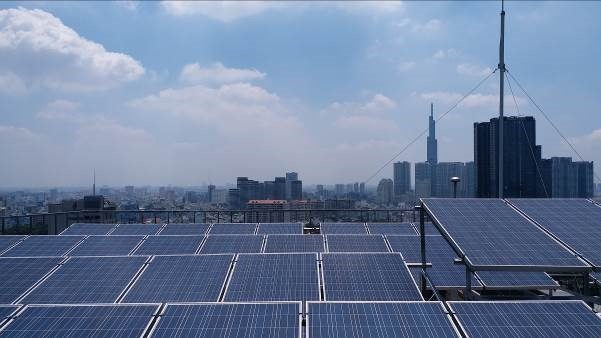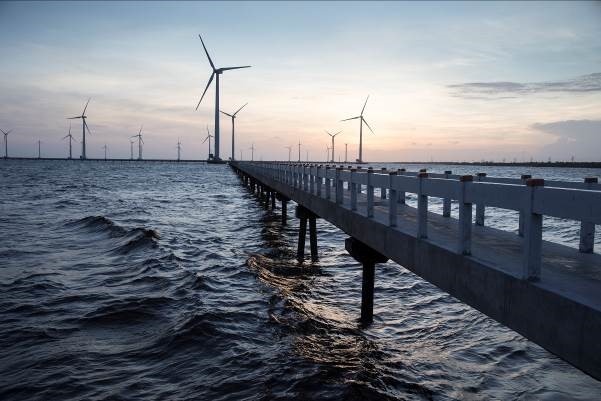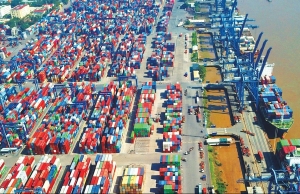Renewable energy policy needed to build momentum
Vietnam’s energy transition has got off to an impressive start, with the country developing over 18,500MW of solar PV, and over 4,000MW of onshore wind within the span of a few years. The country now has more wind and solar capacity than any country in the ASEAN region, making it a leader in renewable energy deployment among emerging markets.
Renewable energy has played an important role in mobilising domestic and international investors in Vietnam’s power sector in recent years. About $15-18 billion has been pumped into Vietnam’s solar sector between 2019 and 2021, with approximately a further $6 billion injected in wind power over the period. This is a time when investments in many other sectors incurred a halt by the pandemic.
 |
With several coal plants in Vietnam having experienced delays, renewable energy has been vital to ensuring that enough power was available to meet the rapid growth in power demand that occurred after the pandemic. In the process, Vietnam has been successful at developing valuable skills and knowledge, creating jobs, and kick-starting new business sectors.
Vietnam’s successes widely appreciated
Vietnam is deemed a leading country in Southeast Asia, with a strong policy framework and a good track record of leadership on the energy transition.
The country’s policy success, however, is now showing a sign of slowing down as vital incentive policies are still in the making, especially under the circumstances that Vietnam is undergoing a host of adjustments to its grid infrastructure and to its planning process to accommodate higher shares of variable renewables in the future.
While these adjustments take time and have given Vietnam the chance to take a breather from the rapid pace of renewable energy deployment it experienced in 2020-2021, the country needs to soon return to the race to reap more benefits from socioeconomic development.
 |
Domestically, stakeholders are focusing on finding solutions after Feed-in Tariff policy, synchronising the development of power sources, power grids and load demand, while avoiding the FIT “cliff effect”, particularly regarding December 2020 benchmark when over 6GW of new solar capacity came online within a matter of weeks to become eligible for preferential tariffs.
Many countries have experienced similar booms in deployment as developers rushed to meet policy deadlines, including Germany in 2011-2012, and Spain in 2008-2009. In all three cases, this surge in solar PV deployment was followed by a lull in project development and a significant decline in investment in the sector.
In Vietnam’s case, the phase of policy uncertainty that has been in place since early 2021 has brought new project development to a standstill, undermining much-needed investments in new power generation capacity.
Vietnam is not alone in facing challenges with energy transition
The energy transition and the move towards net-zero economies represents the most rapid and profound transformation of our economies and our societies that humankind has ever experienced.
| With solar PV and wind energy now being the cheapest sources for electricity production, the further expansion of renewables will benefit Vietnam’s economic development. |
These challenges need to be met head-on with a view to preserving policy stability and promoting sustained investments in the country’s energy sector. Policymakers and lawmakers need to retain the flexibility to adapt the policy framework over time, and to learn from past experiences.
Adelaide in South Australia, has recently met over 100 per cent of its electricity demand for a period of 10 days from wind and solar alone. Meanwhile, California has also recently supplied over 100 per cent of its needs with both wind and solar, with solar PV representing more than two thirds of the total.
Vietnam’s power authority Electricity of Vietnam has realised this, and is now pushing for more renewable energy deployment from wind, solar, and even offshore wind to meet rapidly growing electricity demand.
In this first “market stimulation phase” Vietnam has managed to exceed its renewable energy targets.
Next phase
The next step for Vietnam is to ensure the renewables can be better integrated into the electricity system, that measures are introduced to increase the flexibility of demand, that renewables with more stable output such as offshore wind are expanded, and that more flexible, rapid-response resources such as storage are introduced to improve balancing and provide ancillary services.
With solar PV and wind energy now being the cheapest sources for electricity production, the further expansion of renewables will benefit Vietnam’s economic development.
For Vietnam to retain its position as front-runner in the ASEAN region, a comprehensive policy and legal framework for the renewable energy sector is required.
This should include establishing an overarching energy transition law, a new policy for rooftop solar both for residential and for commercial and industrial customers, the implementation of rules for bilateral PPAs between buyers and sellers, the introduction of renewable energy auctions, and the launch of a fast-track regime to accelerate investments in offshore wind.
The renewable energy industry is evolving rapidly. Last year, China installed over 87GW of new solar power capacity and 37GW of wind power, while Thailand has recently updated their Feed-in Tariff policy to open up the market to more investment; now it might be unwise for Vietnam to stand still.
 | The keys to economic momentum Key experts spoke to VIR about the outlook for the years ahead. |
 | Momentum for seaports hard to retain While complex global developments are affecting the performance of seaports, action is needed to ensure growth momentum. |
 | $15.5 billion in financing for green energy from Just Energy Transition Partnership 2023 could be an interesting year for Vietnam’s energy sector, as $15.5 billion of financing is set to be mobilised for Vietnam’s green energy transition through a recent energy partnership. |
What the stars mean:
★ Poor ★ ★ Promising ★★★ Good ★★★★ Very good ★★★★★ Exceptional
Related Contents
Latest News
More News
- Trung Nam-Sideros River consortium wins bid for LNG venture (January 30, 2026 | 11:16)
- Vietnam moves towards market-based fuel management with E10 rollout (January 30, 2026 | 11:10)
- Envision Energy, REE Group partner on 128MW wind projects (January 30, 2026 | 10:58)
- Vingroup consults on carbon credits for electric vehicle charging network (January 28, 2026 | 11:04)
- Bac Ai Pumped Storage Hydropower Plant to enter peak construction phase (January 27, 2026 | 08:00)
- ASEAN could scale up sustainable aviation fuel by 2050 (January 24, 2026 | 10:19)
- 64,000 hectares of sea allocated for offshore wind surveys (January 22, 2026 | 20:23)
- EVN secures financing for Quang Trach II LNG power plant (January 17, 2026 | 15:55)
- PC1 teams up with DENZAI on regional wind projects (January 16, 2026 | 21:18)
- Innovation and ESG practices drive green transition in the digital era (January 16, 2026 | 16:51)

 Tag:
Tag:

























 Mobile Version
Mobile Version